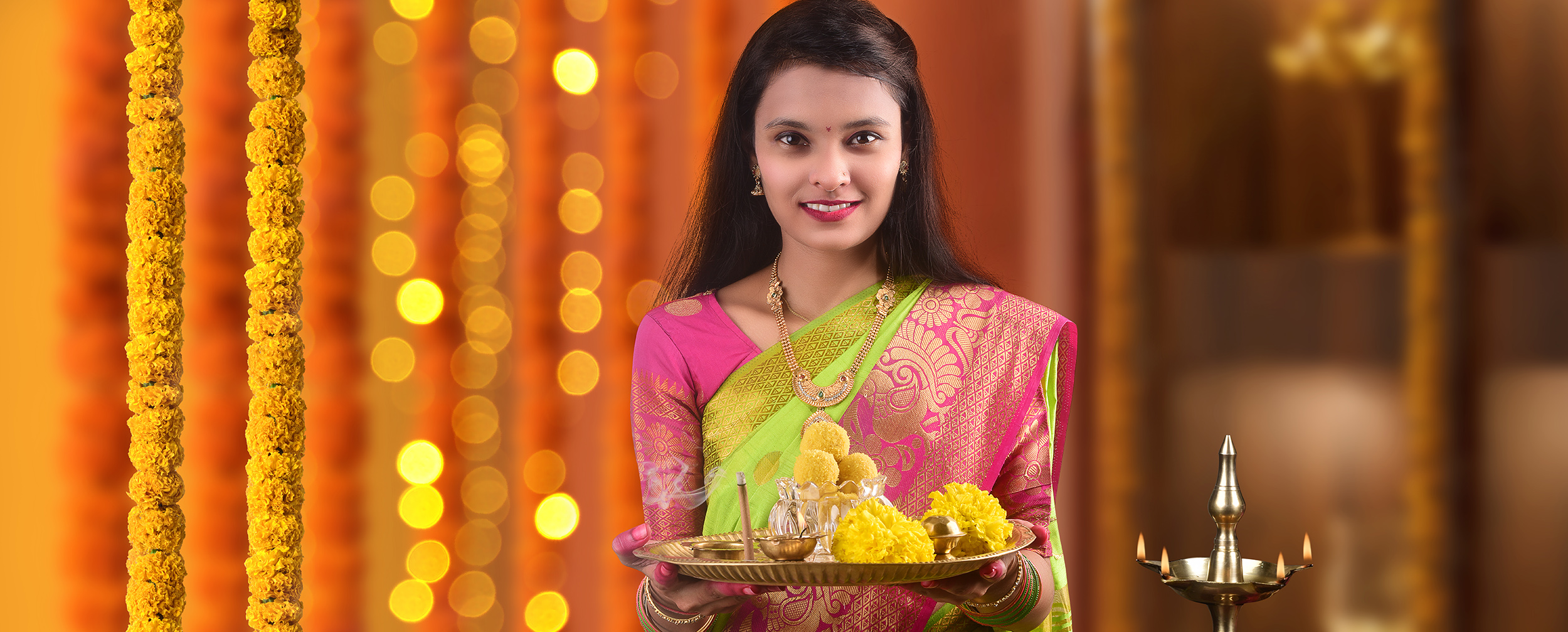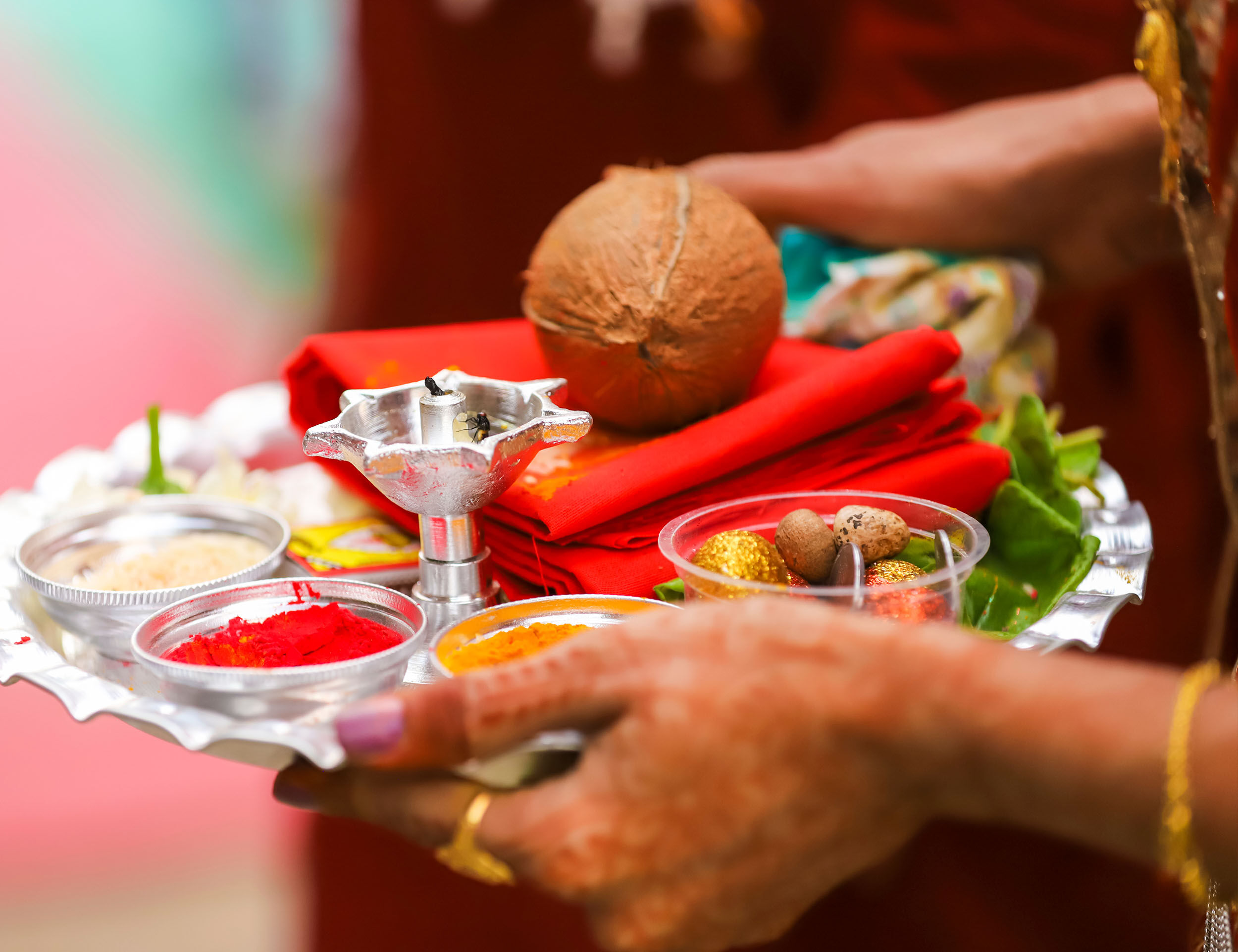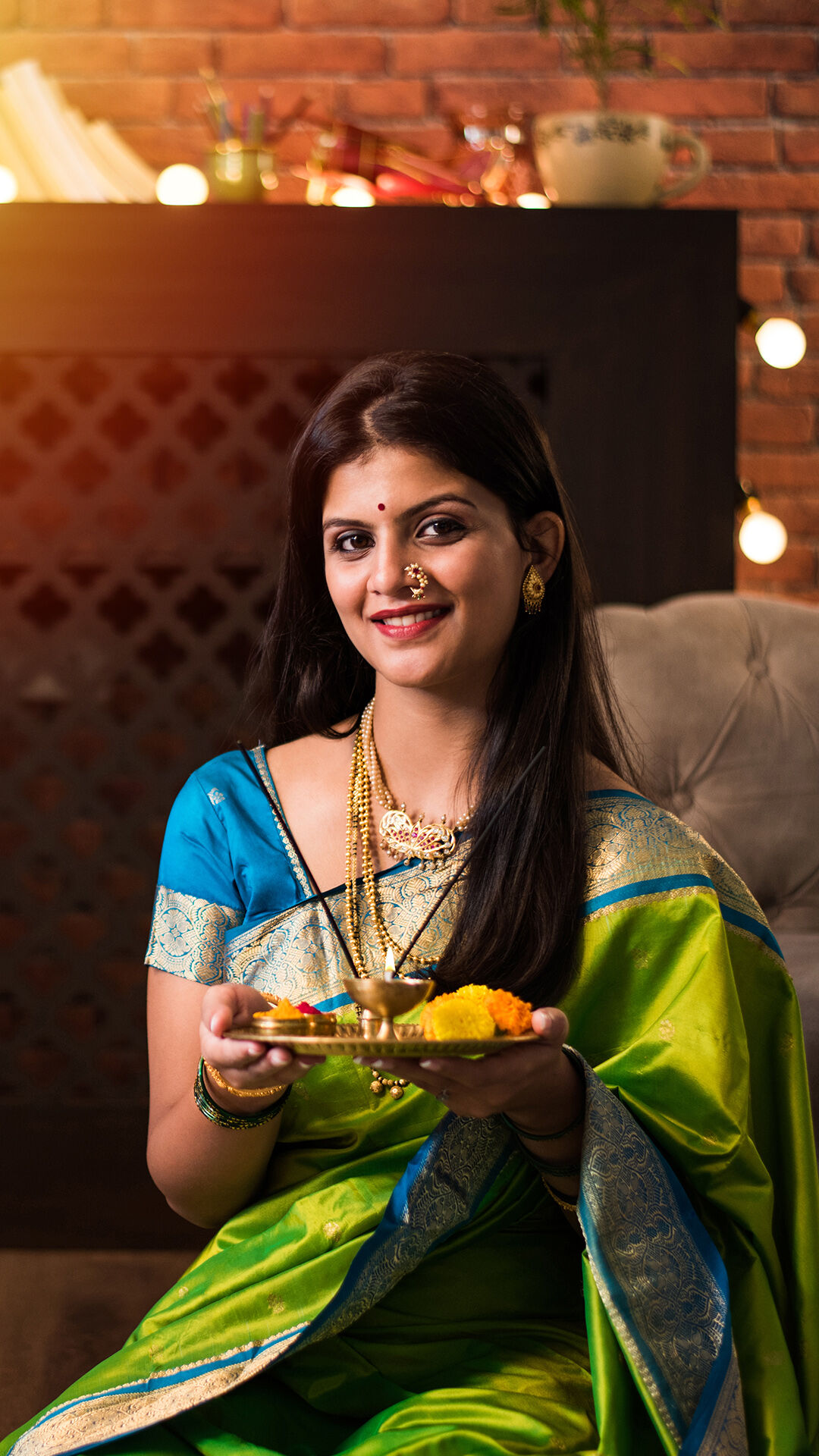STORIES BY DIWAS

Lifestyle
Traditional Pooja Thali Elements & The Powerful Meanings They Hold
Date 9 September 2025 Reading time: 7-10 mins
A pooja thali is more than a platter of religious items - it's a sacred canvas where every element has a story to tell. Have you ever wondered why certain things always make an appearance during your daily prayers or on special occasions? As it turns out, each item on a traditional pooja thali holds deep spiritual significance.
From the gentle glow of diyas to the sweet scent of incense, everything serves a unique purpose in creating an atmosphere conducive to worship. Suppose you've ever been curious about the "why" behind these ritual essentials, you're not alone. Let's explore the symbolism woven into every item on a traditional pooja thali.
The Importance of Pooja Thali in Hindu Rituals
In the vibrant tapestry of Hindu traditions, the traditional pooja thali holds a deeply revered place, serving as both a symbolic and functional centrepiece during religious ceremonies and daily worship. Typically crafted from metals like brass or silver, this sacred plate is more than just a holder of ritual items; it is a physical manifestation of devotion and a meaningful bridge between the material and spiritual realms. The process of preparing a traditional pooja thali is often seen as a meditative act, where each element is thoughtfully arranged to create a sense of harmony that welcomes divine energy. Even the circular design of the thali is rich in symbolism, reflecting the cyclical nature of life and the interconnectedness of all existence.
Passed down through generations, the traditional pooja thali continues to be an essential part of Hindu households, offering not just a ritualistic function but also serving as a daily reminder to pause, reflect, and reconnect with the sacred amidst the routines of everyday life.
Elements of a Traditional Pooja Thali
Diya: The Light of Devotion
The flickering flame of a diya is one of the most iconic elements of a traditional pooja thali, symbolising the dispelling of darkness and the arrival of divine light. Lit at the start of prayers or rituals, the diya represents knowledge, wisdom, and the inner light that guides spiritual growth. Whether made of simple clay or ornate brass, its steady flame reflects unwavering devotion and serves as a gentle reminder to keep our inner light burning, regardless of life’s challenges.
Incense Sticks: The Fragrance of Purity
The soothing aroma of incense is a key part of any traditional pooja thali, with its fragrant smoke gently filling the space as prayers begin. More than just scent, incense purifies the environment, calms the mind, and creates a peaceful atmosphere for meditation and worship. When exploring pooja thali ideas, including the right incense can transform the space by carrying our prayers to the divine through its rising smoke, acting as a bridge between the physical and spiritual realms. Whether it's the grounding scent of sandalwood or the uplifting fragrance of jasmine, choosing the right aroma is an important part of pooja thali ideas, helping to deepen focus and invite a sense of presence during the ritual.
Kumkum and Haldi: The Symbols of Prosperity
No traditional pooja thali is complete without the vibrant presence of kumkum and haldi, two sacred powders rich in symbolism and tradition. Kumkum, with its deep red hue, represents Shakti or divine feminine energy and is often applied as a tilak to awaken spiritual awareness.
Haldi, the golden-yellow turmeric, is known for its purifying and healing qualities, symbolising prosperity and fresh beginnings. Used together, they not only add colour to the thali but also balance spiritual energy—kumkum embodying passion and power, and haldi offering grounding and protection to the ritual space. Including both in your ideas ensures a thoughtful blend of tradition, symbolism, and spiritual intention.
Flowers: The Expression of Reverence
Fresh flowers are an essential part of any pooja thali, adding natural beauty, colour, and fragrance to the sacred space. In Hindu traditions, offering flowers to the divine is a heartfelt act of devotion—a way to express love, gratitude, and reverence. When exploring pooja thali ideas, incorporating fresh blooms brings both spiritual meaning and aesthetic charm to your setup. Each flower carries its own symbolism and is often chosen based on the deity or occasion; marigolds, with their vibrant orange tones, symbolise abundance and are linked to the sun, while jasmine, with its white petals and sweet scent, represents purity and spiritual awakening.
As you explore ideas, arranging flowers becomes more than just decoration—it’s a mindful ritual. Their delicate beauty and fleeting nature remind us of life’s impermanence and the importance of living in the present. Offering flowers is a symbolic gesture of giving our best to the divine, while also grounding us in a moment of stillness and reflection. Whether you’re creating a simple setup or seeking creative pooja thali ideas, adding fresh flowers brings serenity, meaning, and a gentle invitation to connect more deeply with the sacred.
Prasad: The Offering of Love
Prasad, or sacred food offerings, hold a special place on the pooja thali. These small portions of fruit, sweets, or other delicacies are first offered to the divine, then shared among devotees as a symbol of grace and blessings.
The act of offering prasad is a way to express our gratitude and surrender. By presenting the divine with the best of what we have, we acknowledge that all things come from a higher source. It's a reminder to approach life with a spirit of generosity and selflessness.
Prasad can take many forms - from simple sugar crystals to elaborate sweets crafted with care. The key is the intention behind the offering in a traditional pooja thali. As you place the prasad on your pooja thali, infuse it with your love and devotion, knowing that it will be transformed into a vessel of divine energy.
Sharing prasad among fellow devotees is also an important aspect of the ritual. It represents the idea that divine grace is meant to be shared, that we are all connected in the web of life. As you partake in the blessed food, allow it to nourish not just your body but also your soul.
Bell: The Sound of Divinity
The melodious chime of a bell is an integral part of many pooja rituals. The small handbell, usually made of brass or bronze, is rung at specific moments during the ceremony, creating a gentle yet powerful sound that resonates through the space.
On a practical level, the bell is used to invoke the deity's attention and to signal the beginning and end of the ritual. But its significance goes far beyond mere utility. The sound of the bell is believed to have a purifying effect, dispelling negative energies and creating a space for the divine to enter.
In some traditions, the bell is also associated with the primordial sound of creation, the cosmic Om. As you ring the bell, allow its vibrations to sync with your own breath and heartbeat, connecting you to the pulse of the universe.
The act of ringing the bell also serves as a reminder to be present and attentive during the ritual. As the chime fades into silence, let it be a cue to bring your awareness back to the sacred space, to the here and now.
Traditional Pooja Thali Ideas for Different Occasions
While the core elements of a pooja thali remain consistent, there's plenty of room for creativity and personalisation based on the occasion or your individual style. Here are a few ideas to inspire your own pooja thali designs:
- For a festive touch, consider using a brass pooja thali set with intricate engravings or embellishments. The gleaming metal adds a sense of opulence and celebration to your prayers. You can flaunt a mustard yellow kurta with petal motifs to echo the festive warmth and richness of the setup.
- If you're looking for a more understated look, opt for a copper pooja thali with clean lines and minimal adornments. The earthy hue of copper creates a grounding and serene atmosphere. A cream white buta-patterned kurta with sequinned neckline will complement this simplicity while adding just a hint of elegance.
- For daily prayers, a simple stainless steel pooja thali is both practical and elegant. The sleek surface is easy to clean and maintain, making it a convenient choice for regular use. A maroon red buta embroidered kurta is a perfect everyday pick, comfortable, classic, and refined.
- Add a personal touch to your thali by including items that hold special meaning for you. Perhaps a small figurine of your favourite deity, a treasured crystal, or a photograph of your guru. Let your thali be a reflection of your unique spiritual journey. Dressing in a royal purple sequin-embellished kurta adds a sense of occasion and reverence to this intimate expression of devotion.
Traditional Pooja Thali: A Blend of Devotion, Symbolism, and Style
Remember, the beauty of a pooja thali lies not just in its physical appearance but in the intention and devotion you bring to your practice. Whether you choose a traditional brass set or a modern minimalist design, what matters most is the sincerity of your prayers and the openness of your heart.
As you gather the elements for your next pooja thali set, take a moment to reflect on the rich symbolism woven into each item. From the light of the diyas to the fragrance of the incense, every component serves a sacred purpose, guiding us deeper into the realm of devotion.
Let your pooja thali set be a reminder to approach life with reverence and gratitude, to find the extraordinary in the ordinary. As you lay out the sacred plate, know that you are participating in a timeless tradition, one that connects you to the wisdom of the ages and the love of the divine.
Now that you’ve thoughtfully curated your pooja thali set, it’s time to complete the moment by dressing in attire that matches the grace of the occasion. Whether you're looking for a timeless kurta for men, relaxed casual kurtas, elegant printed kurtas, or classic solid kurtas, Diwas has just the right ensemble to elevate your festive look. Pair them with our comfortable straight fit pajamas or go bold with intricately detailed embroidery kurtas, because devotion deserves to be reflected not just in your rituals, but in your style too.



